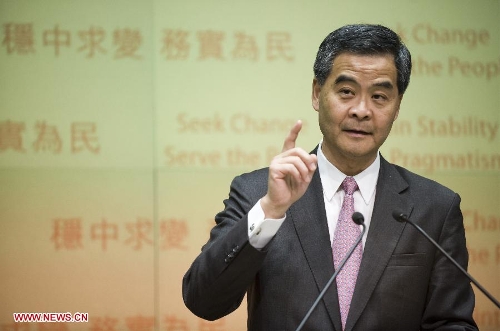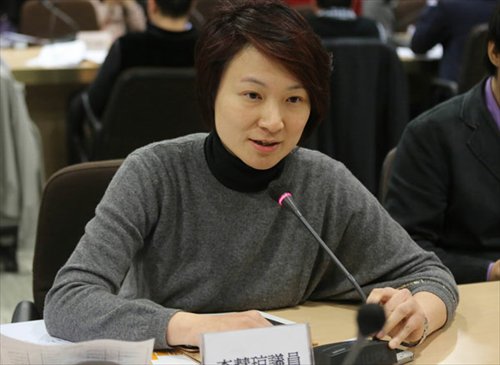Beijing publishes white paper on Hong Kong policy
| Editor’s Note |
The Chinese central government reaffirmed its "overall jurisdiction" over Hong Kong in an official document released on June 10, two weeks before an unofficial "referendum" over suffrage rights in the region promoted by a civil movement.
The State Council Information Office on June 10 published a white paper detailing the "one country, two systems" approach in Hong Kong. It stated the Chinese government's overall power to govern the Special Administrative Region (SAR).
| Highlights |
● Under this system, the central government exercises overall jurisdiction over the HKSAR, including the powers directly exercised by the central government, and the powers delegated to the HKSAR by the central government to enable it to exercise a high degree of autonomy in accordance with the law.
● The high degree of autonomy of HKSAR is not an inherent power, but one that comes solely from the authorization by the central leadership. The high degree of autonomy of the HKSAR is not full autonomy, nor a decentralized power.
● The white paper called for resolutely safeguarding the authority of the country's Constitution and the Basic Law of Hong Kong.
● The Hong Kong people who govern Hong Kong "should above all be patriotic."
● It is a solemn commitment of the central government that ultimately the chief executive will be selected by universal suffrage upon nomination by a broad representative nominating committee in accordance with democratic procedures. Election of all members of the Legislative Council will be by universal suffrage.
● The Chinese mainland has provided "solid backing" for Hong Kong's prosperity and stability over the years, by helping the special administrative region defuse risks and strengthening competitiveness.
● The democratic political system of the Hong Kong Special Administrative Region (HKSAR) has been steadily promoted since its return to the motherland in 1997.
Full Text: The Practice of the "One Country, Two Systems" Policy in the Hong Kong Special Administrative Region
| Interpretation |
Zou Pingxue, deputy head of the Center for Basic Laws of Hong Kong and Macao Special Administrative Regions, Shenzhen University
These remarks display firm determination and undoubted sincerity, said Zou, adding that answers to disputes and controversy about the future of Hong Kong's political system can be found in this report.
Qiang Shigong, director of the Center for Hong Kong and Macao Studies, Peking University
This statement was a reply to the argument raised by some Hong Kong people that there is no legitimacy to ask the chief executive to be patriotic.
Patriotism is a basic ethic for a politician in any place of the world, including Hong Kong which is part of China, Qiang said.
"The reason why the white paper reiterates and interprets the principle of 'one country, two systems' is to avoid such misunderstanding," he said.
Source: Xinhua
Qi Pengfei, director of the Center for Hong Kong, Macao and Taiwan Studies, Renmin University of China
This is the first white paper on Hong Kong in the 88 published since 1991. Now is an opportune time to publish, as it can help explain new situations and understand problems that have cropped up in the development of Hong Kong. The timing also corresponds with the 30th anniversary of diplomatic relations between China and the UK, the 24th anniversary of the promulgation of the Basic Law of Hong Kong, and the 17th anniversary of Hong Kong’s return to China.
Source: People’s Daily (Overseas Edition)
Rao Geping, member of the Hong Kong Special Administrative Region Basic Law Committee of the NPC Standing Committee
The Central Government, which has the inherent jurisdiction of Hong Kong, authorizes Hong Kong’s high degree of autonomy, considering its special conditions.
This white paper can be regarded as a summary and retrospect of the 17-year "One Country, Two Systems" Policy and the Basic Law of Hong Kong, which deems them both necessary and reasonable.
The white paper also helps Hong Kong citizens better understand the "One Country, Two Systems" Policy and the Basic Law of Hong Kong, and hopes to better facilitate the general election in 2017.
Source: Hong Kong-based Ta Kung Pao
| Response |
 Photo: protocol.gov.hk | The HKSAR government welcomed the white paper and encouraged the public to read it in detail for a deeper and comprehensive understanding of the practice of "one country, two systems" in the HKSAR. |
 Photo: Xinhua | Hong Kong Chief Executive Leung Chun-ying told a press conference the white paper has helped Hong Kong and the world with an in-depth understanding of the "one country, two systems" policy. He insisted the statement has no conflict with Hong Kong's high degree of autonomy, and believed the release date "has nothing to do with what will happen soon in Hong Kong society." |
 Photo: takungpao.com | Executive Council member and legislative councilor Starry Lee Wai-king of the Democratic Alliance for the Betterment and Progress of Hong Kong told the Global Times that the drafting of the white paper took one year, so could not be aimed at recent events. "Hong Kong is a part of China, and it is reasonable for the central government to fully rule over Hong Kong, and this is the original spirit stipulated in the Basic Law," she said. |
| Related Reports |

